 This November, Texas voters previously disenfranchised by way of GOP state lawmaker's illicit voter suppression scheme will have the opportunity to deliver payback at the polls.
This November, Texas voters previously disenfranchised by way of GOP state lawmaker's illicit voter suppression scheme will have the opportunity to deliver payback at the polls.
After a series of elections in which some 608,000 disproportionately African-American and Hispanic lawfully registered Texas voters saw their right to vote imperiled by newly draconian polling place photo ID restrictions, the parties to Veasey v. Abbott, the landmark challenge to Texas' strict polling place photo ID voting law, have agreed upon terms to allow all legal voters to cast their ballots. This week, following a series of crushing court defeats for Texas Republicans, the parties finally submitted a Joint Submission of Agreed Terms for the federal District Court's approval. The terms, a result of rulings by one of the most conservative appellate courts in the nation, contain a fourteen point list of remedial actions that should go a long way towards relieving the damage to democracy wrought by the Lone Star State GOP's illegal voter suppression scheme.
As U.C. Irvine Law Professor Rick Hasen reminds us, this agreement does not necessarily amount to a total capitulation on the part of Texas Republicans. By entering this stipulation, the state waives its right to appeal the agreed upon remedy. But there's still time for them --- banking on a Donald Trump victory in November --- to launch a Hail Mary effort to have the Supreme Court review the very conservative 5th Circuit's decision, which upheld the U.S. District Court's finding that SB14, the voting restriction by state Republicans, opposed for nearly a decade by state Democrats and voting rights advocates alike, violates the provisions of Section 2 of the federal Voting Rights Act (VRA) of 1965.
The agreed-upon remedies include a much broader and far more reasonable set of potential IDs that voters may use at the polling place when voting, along with the signing of a "reasonable impediment declaration" as to why they cannot obtain a photo ID. Voters who comply with these procedures are entitled to cast regular ballots --- as opposed to provisional ballots which are more easily not included in official tallies. Importantly, the reasons for signing such a declaration "shall not be questioned" by either poll workers or poll watchers, according to the terms of the agreement.
Specifically, the parties agreed on an order containing the following points [emphasis added]...
2. Voters who appear on the official list of registered voters and present a valid voter registration certificate, a certified birth certificate, a current utility bill, a bank statement, a government check, a paycheck, or any other government document that displays the voter's name and address and complete and sign a reasonable impediment declaration shall be permitted to vote using a regular ballot.
3. Defendants shall use the document attached to this Order as Exhibit 1 as the English language reasonable impediment declaration.
4. Defendants shall ensure that the reasonable impediment declaration is translated into Spanish, Chinese, and Vietnamese for use in appropriate jurisdictions. Defendants shall also inform the Elections Administrators in El Paso County and Maverick County in writing of the need to include the reasonable impediment declaration in the list of documents that need to be orally translated in accordance with Section 203 of the Voting Rights Act, 52 U.S.C. § 10503.
5. The reasonableness of a voter's impediment to obtain SB 14 ID shall not be questioned by election officials.
6. After asking a voter if he or she has SB 14 ID, election officials shall not question or challenge voters concerning the voter's lack of SB 14 ID and the voter's claimed impediment to obtaining SB 14 ID prior to allowing a voter to cast a regular ballot with a reasonable impediment declaration.
7. A signed reasonable impediment declaration shall be rejected only upon conclusive evidence that the person completing the declaration is not the person in whose name the ballot will be cast.
8. No identification document provided pursuant to Paragraphs 1 or 2 shall be rejected based on the fact that the address on such document does not match the address recorded in the official list of registered voters.
9. Pursuant to Section 33.058 of the Texas Election Code, poll watchers shall not be permitted to communicate in any manner with any voter concerning the procedures outlined in this Order, presentation of identification, or the validity of a voter’s impediment to obtain identification.
10. Defendants shall develop a detailed voter education plan, including timetables, for the November 2016 general election by no later than August 15, 2016. This plan shall include a statement of the total planned expenditure, in an amount equal to or greater than $2,500,000.
11. Commencing with any elections held after the entry of this Order and until further order of the Court, Defendants shall continue to educate voters in subsequent elections concerning both voter identification requirements and the opportunity for voters who do not possess.
12. Defendants shall develop a detailed election official training program for the November 2016 general election by no later than August 15, 2016.
13. Defendants shall not modify the English-language reasonable impediment declaration attached to this Order as Exhibit 1 without either submission of a Notice to this Court including both a copy of the document and a statement indicating that all Plaintiffs have consented to the modification or an order of this Court.
14. These procedures shall remain in place until further order of this Court. Nothing in this order shall prevent any party from seeking relief based on future events, including but not limited to legislative action.
*Subsequent to submission of these terms, the plaintiffs, who include the U.S. Department of Justice, filed a request that would permit them, through their legal counsel, "to provide meaningful input into the development of material aspects of the voter education and election official training programs."
It should not be all that difficult for most of those who lack the previously exclusive mandatory Photo ID to meet the newer, far more inclusive ID requirements and to sign a declaration affidavit concerning their "reasonable impediment".
After all, if the Court accepts these remedies, the "reasonable impediment declaration" option will be presented in response to what the U.S. District Court described as the strictest photo ID law in the nation, one that did not merely have a retrogressive impact on the voting rights of minorities and the poor, but imposed extraordinary burdens such as requiring individuals who neither possessed a car nor a driver's license to travel more than 200 miles round trip to the nearest Department of Public Safety (while also losing time from work) in order to obtain the type of supposedly "free" ID never before required of that lawfully registered voter.
Hasen observed that the order "looks like a darn good deal for plaintiffs (and it means no further appeals on scope of interim remedy by the state)."
I concur. It leaves in place the finding that Texas Republicans violated Section 2 of the Voting Rights Act. While the agreement does not, of itself, reflect an admission by state Republicans that they foisted a photo ID law that illegally violated the Voting Rights Act on their own citizens, it does suggest a recognition that they'd have virtually no chance of overturning the 5th Circuit's ruling on that issue at the currently 4-4 divided U.S. Supreme Court.
Additionally, the agreement doesn't prevent the plaintiffs from continuing to pursue a permanent injunction that would prevent Texas from ever enforcing its photo ID law based on the previous court finding that SB14 was racially motivated by the partisan lawmakers who enacted it.
There's one more intriguing feature. As The BRAD BLOG recently reported, Texas Republicans, as of July 17, had already squandered some 3.5 million in taxpayer dollars defending SB14 in courts of law. Under the terms of this agreement, Texas Republicans, who claim to be "fiscal conservatives", will now be forced to spend a minimum of an additional $2.5 million in taxpayer money in order to remedy the damage wrought by their illegal photo ID statute.
In reality, even a permanent injunction at this point would not amount to an adequate remedy. The 608,000 Texans who were unlawfully stripped of their right to vote during the last several elections can never be made whole.
Ernest A. Canning is a retired attorney, author, Vietnam Veteran (4th Infantry, Central Highlands 1968) and a Senior Advisor to Veterans For Bernie. He has been a member of the California state bar since 1977. In addition to a juris doctor, he has received both undergraduate and graduate degrees in political science. Follow him on twitter: @cann4ing


 From CA's 'Nuclear Deterrence' Map to Newsom's Trolling to Trump's 'Fascist Theatre' and Beyond: 'BradCast' 8/21/25
From CA's 'Nuclear Deterrence' Map to Newsom's Trolling to Trump's 'Fascist Theatre' and Beyond: 'BradCast' 8/21/25 'Green News Report' 8/21/25
'Green News Report' 8/21/25
 On 'Americanism' and Trump's 'Stalinesque' Plot to Whitewash U.S. History: 'BradCast' 8/20/25
On 'Americanism' and Trump's 'Stalinesque' Plot to Whitewash U.S. History: 'BradCast' 8/20/25 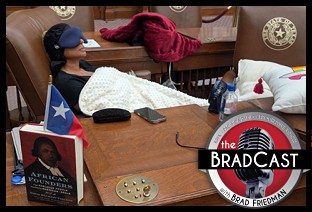 Texas GOP Imprisons Dem State Lawmaker in State House Chamber: 'BradCast' 8/19/25
Texas GOP Imprisons Dem State Lawmaker in State House Chamber: 'BradCast' 8/19/25 'Green News Report' 8/19/25
'Green News Report' 8/19/25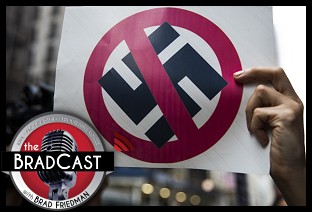 Trump, Nazis and
Trump, Nazis and  Sunday '
Sunday '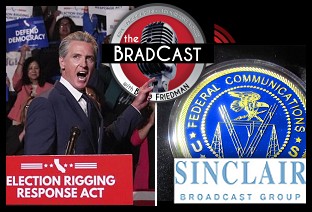 Newsom's 'Election Rigging Response Act'; FCC's License Renewal for Sock-Puppeting Sinclair: 'BradCast' 8/14/25
Newsom's 'Election Rigging Response Act'; FCC's License Renewal for Sock-Puppeting Sinclair: 'BradCast' 8/14/25 'Green News Report' 8/14/25
'Green News Report' 8/14/25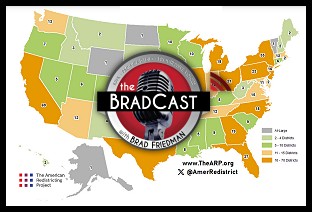 140 New House Reps?: Moving Beyond the Gerrymandering Wars: 'BradCast' 8/13/25
140 New House Reps?: Moving Beyond the Gerrymandering Wars: 'BradCast' 8/13/25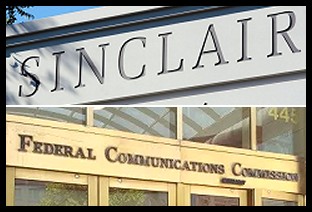 FCC Renews Sinclair TV Licenses Despite Complaint from Petitioner Who Died Waiting
FCC Renews Sinclair TV Licenses Despite Complaint from Petitioner Who Died Waiting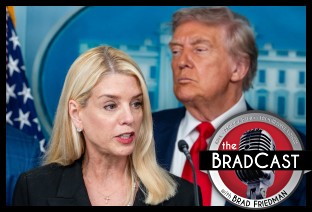 It's Not About the Rule of Law, It's About Authoritarian Control: 'BradCast' 8/12/25
It's Not About the Rule of Law, It's About Authoritarian Control: 'BradCast' 8/12/25 'Green News Report' 8/12/25
'Green News Report' 8/12/25 After Vaccine Cancels, CDC Shooting, Former Officials Want RFK Out: 'BradCast' 8/11/25
After Vaccine Cancels, CDC Shooting, Former Officials Want RFK Out: 'BradCast' 8/11/25 Sunday 'All's Well' Toons
Sunday 'All's Well' Toons 'Green News Report' 8/7/25
'Green News Report' 8/7/25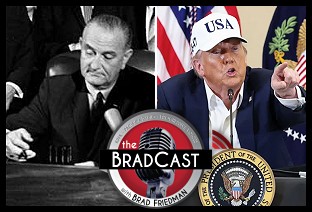 Trump Wars Against Greem Energy, Democracy on VRA's 60th: 'BradCast' 8/7
Trump Wars Against Greem Energy, Democracy on VRA's 60th: 'BradCast' 8/7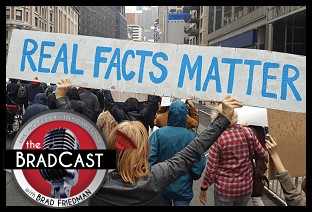 Media Conglomerates Continue Trump Capitulation: 'BradCast' 8/6/25
Media Conglomerates Continue Trump Capitulation: 'BradCast' 8/6/25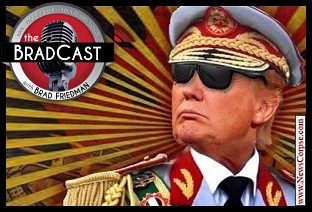 Banana Republican: Trump Shoots the Labor Statistics Messenger: 'BradCast' 8/5/25
Banana Republican: Trump Shoots the Labor Statistics Messenger: 'BradCast' 8/5/25 All's Fair in Love, War and, Apparently, Part-isan Gerrymandering: 'BradCast' 8/4/25
All's Fair in Love, War and, Apparently, Part-isan Gerrymandering: 'BradCast' 8/4/25 The Art of the Corrupt, Phony, Unlawful, Pretend Trade Deal: 'BradCast' 7/31/25
The Art of the Corrupt, Phony, Unlawful, Pretend Trade Deal: 'BradCast' 7/31/25 Battle Begins Against Trump EPA Climate Regulations 'Kill Shot': 'BradCast' 7/30/25
Battle Begins Against Trump EPA Climate Regulations 'Kill Shot': 'BradCast' 7/30/25 A Pu Pu Platter of Trump Corruption: 'BradCast' 7/29/25
A Pu Pu Platter of Trump Corruption: 'BradCast' 7/29/25 'Catastrophic' GOP Cuts to Medicaid, Medicare, ACA: 'BradCast' 7/28/25
'Catastrophic' GOP Cuts to Medicaid, Medicare, ACA: 'BradCast' 7/28/25
 VA GOP VOTER REG FRAUDSTER OFF HOOK
VA GOP VOTER REG FRAUDSTER OFF HOOK Criminal GOP Voter Registration Fraud Probe Expanding in VA
Criminal GOP Voter Registration Fraud Probe Expanding in VA DOJ PROBE SOUGHT AFTER VA ARREST
DOJ PROBE SOUGHT AFTER VA ARREST Arrest in VA: GOP Voter Reg Scandal Widens
Arrest in VA: GOP Voter Reg Scandal Widens ALL TOGETHER: ROVE, SPROUL, KOCHS, RNC
ALL TOGETHER: ROVE, SPROUL, KOCHS, RNC LATimes: RNC's 'Fired' Sproul Working for Repubs in 'as Many as 30 States'
LATimes: RNC's 'Fired' Sproul Working for Repubs in 'as Many as 30 States' 'Fired' Sproul Group 'Cloned', Still Working for Republicans in At Least 10 States
'Fired' Sproul Group 'Cloned', Still Working for Republicans in At Least 10 States FINALLY: FOX ON GOP REG FRAUD SCANDAL
FINALLY: FOX ON GOP REG FRAUD SCANDAL COLORADO FOLLOWS FLORIDA WITH GOP CRIMINAL INVESTIGATION
COLORADO FOLLOWS FLORIDA WITH GOP CRIMINAL INVESTIGATION CRIMINAL PROBE LAUNCHED INTO GOP VOTER REGISTRATION FRAUD SCANDAL IN FL
CRIMINAL PROBE LAUNCHED INTO GOP VOTER REGISTRATION FRAUD SCANDAL IN FL Brad Breaks PA Photo ID & GOP Registration Fraud Scandal News on Hartmann TV
Brad Breaks PA Photo ID & GOP Registration Fraud Scandal News on Hartmann TV  CAUGHT ON TAPE: COORDINATED NATIONWIDE GOP VOTER REG SCAM
CAUGHT ON TAPE: COORDINATED NATIONWIDE GOP VOTER REG SCAM CRIMINAL ELECTION FRAUD COMPLAINT FILED AGAINST GOP 'FRAUD' FIRM
CRIMINAL ELECTION FRAUD COMPLAINT FILED AGAINST GOP 'FRAUD' FIRM RICK SCOTT GETS ROLLED IN GOP REGISTRATION FRAUD SCANDAL
RICK SCOTT GETS ROLLED IN GOP REGISTRATION FRAUD SCANDAL VIDEO: Brad Breaks GOP Reg Fraud Scandal on Hartmann TV
VIDEO: Brad Breaks GOP Reg Fraud Scandal on Hartmann TV RNC FIRES NATIONAL VOTER REGISTRATION FIRM FOR FRAUD
RNC FIRES NATIONAL VOTER REGISTRATION FIRM FOR FRAUD EXCLUSIVE: Intvw w/ FL Official Who First Discovered GOP Reg Fraud
EXCLUSIVE: Intvw w/ FL Official Who First Discovered GOP Reg Fraud GOP REGISTRATION FRAUD FOUND IN FL
GOP REGISTRATION FRAUD FOUND IN FL

































